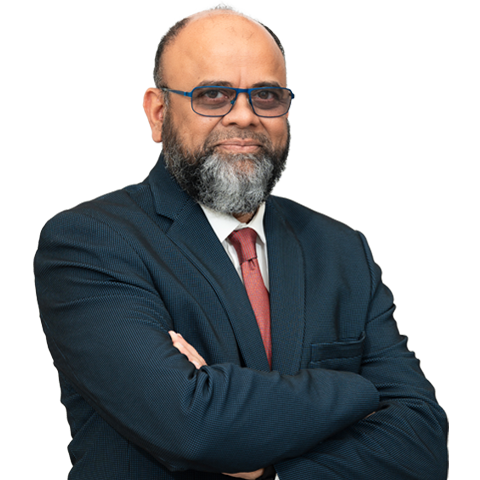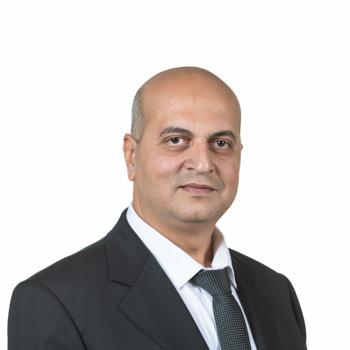
Taj Mohammed Fiyaz Chowdhry
Burjeel Hospital
Dr. Taj Mohammed Fiyaz Chowdhry is a highly qualified Consultant Thoracic Surgeon in Abu Dhabi, specializing in minimally invasive and robotic-assisted thoracic surgeries, with over 15 years of clinical experience

Samiuddin Mohammed
Cleveland Clinic
Dr. Samiuddin Mohammed is an Associate Staff Physician in the Respiratory Institute at Cleveland Clinic Abu Dhabi, specializing in pulmonology with over 23 years of experience.

Puja G. Khaitan
SSMC
Dr. Puja G. Khaitan is an American board-certified general and thoracic surgeon specializing in non-cardiac chest surgeries, focusing on lung cancer, mesothelioma, esophageal cancer and mediastinal masses.
The Hidden Realms of Thoracic Surgery
Within the thoracic cavity, many secrets lie beneath the surface—tumors, obstructions, and anatomical abnormalities. These delicate structures require a masterful approach, and thoracic surgeons possess the expertise to navigate the complexities of the chest, preserving life with skill and precision.
A Dance of Skill and Care
Every surgery is a well-choreographed performance. Instruments are wielded with practiced hands, each incision deliberate and thoughtful. The rhythm of the heartbeat echoes in the background, a constant reminder of the fragility of life. Surgeons must find balance in their actions—deliberate yet swift, with every moment critical.
Fighting the Invisible Enemy
In the operating room, surgeons face unseen foes. Tumors and complications hide within the body, waiting to be confronted. They don’t simply remove disease; they restore a sense of normalcy and vitality. The courage required to take on these hidden battles is immense, and unwavering focus is the key to success.
Beyond the Surgery
Surgery is only the beginning of the healing process. The work continues beyond the operating room, with intensive care and ongoing management playing crucial roles in recovery. Thoracic surgeons stay deeply involved, overseeing post-operative care to help patients manage pain and regain strength.
Emotional Connections
The emotional weight of surgery is as significant as its physical demands. Patients and their families often face a whirlwind of emotions—fear, anxiety, hope, and relief. Thoracic surgeons offer not just medical expertise, but compassionate care, providing comfort and understanding during some of life’s most difficult moments.
Advancements in Surgical Techniques
The field of thoracic surgery evolves continuously. Minimally invasive procedures are reducing recovery times, while robotic-assisted surgeries offer unparalleled precision. Surgeons stay at the forefront of medical innovation, integrating the latest techniques to improve patient outcomes.
Collaborative Care
Thoracic surgeons often work closely with cardiologists, as the heart and lungs are intrinsically connected. This partnership ensures that both cardiac and thoracic health are addressed simultaneously, providing a more holistic approach to patient care.
Critical Decisions in Life and Death
Every moment in the operating room is crucial. The surgeon’s ability to make quick, informed decisions can mean the difference between life and death. With years of experience and finely honed instincts, thoracic surgeons navigate each critical choice with the knowledge that every action carries immense weight.
Cultural Sensitivity in Medicine
In diverse and international settings like Dubai, understanding cultural and religious backgrounds is essential. Thoracic surgeons must navigate these nuances, tailoring their approach to ensure that each patient’s care respects their personal beliefs and values.
Every Patient’s Story
No two patients are the same. Every individual brings their own medical history and personal story to the table. Thoracic surgeons take the time to understand these narratives, ensuring that each treatment plan is personalized to meet the unique needs of every patient.
The Burden of Responsibility
The responsibility of saving lives is enormous. Thoracic surgeons carry the weight of each patient’s future in their hands, driven by a deep sense of duty. This immense responsibility fuels their pursuit of excellence, ensuring they are always striving to provide the best possible care.
Passing the Torch
Experienced thoracic surgeons play a vital role as mentors. Teaching the next generation of surgeons is a crucial aspect of their work, and their legacy is carried on through the students they guide. The passing of knowledge and techniques helps shape the future of thoracic surgery.
The Role of Technology
Technology continues to revolutionize thoracic surgery. Advanced imaging techniques provide clear, detailed views of the chest, and virtual reality assists with surgical planning. These innovations allow surgeons to approach procedures with a level of precision that was once unimaginable, improving outcomes for patients.
The Road to Recovery
Recovery from thoracic surgery is often a long journey. After surgery, patients undergo physical therapy, breathing exercises, and regular follow-ups to help regain their strength. Surgeons continue to support their patients through this process, ensuring each step of recovery is managed with care.
Strength in Resilience
Patients show incredible resilience in the face of surgery. Overcoming pain, enduring recovery, and rebuilding strength, they inspire their surgeons with their courage. This resilience is a powerful reminder of the human spirit’s ability to heal and persevere.
Family as a Support System
Families play a vital role in a patient’s recovery. Their support and involvement are key to the healing process, and thoracic surgeons ensure that families are informed and engaged in their loved one’s care. This collaborative effort helps create a more supportive and effective recovery environment.
Adapting to the Situation
No two surgeries are identical. Surgeons must adapt their techniques to each case, thinking on their feet and adjusting to the situation at hand. This adaptability is a hallmark of expertise, and it often marks the difference between a successful outcome and a missed opportunity.
The Lifeblood of Research
Ongoing research is critical to improving thoracic surgery. Surgeons are continually engaging in studies and clinical trials, pushing the boundaries of what is possible. These efforts drive advancements in surgical techniques, helping improve survival rates and quality of life for patients.
Building Trust Through Connection
The bond between a surgeon and a patient is profound. Every stitch, every decision, builds a connection rooted in trust and mutual respect. This human connection is at the heart of thoracic surgery, and it motivates surgeons to give their best effort every day.
The Humbling Experience of Healing
Successes are humbling, as each life saved is a reminder of the incredible power of medicine. Failures also teach valuable lessons, providing opportunities for growth and improvement. Thoracic surgeons continue to evolve, always learning from their experiences and the complexities of the human body.
Navigating Ethical Dilemmas
Ethics plays a central role in thoracic surgery. Surgeons face difficult decisions about life support, patient consent, and the use of invasive procedures. Balancing medical intervention with patient autonomy requires careful thought and deep integrity.
Endless Challenges
Thoracic surgery presents constant challenges. Each day brings new obstacles to overcome. But thoracic surgeons rise to meet these challenges, driven by an unwavering commitment to healing and improving the lives of their patients.
The Evolving Landscape
The field of thoracic surgery is ever-changing. New diseases, innovative surgical techniques, and shifting patient needs continually reshape the profession. Surgeons must remain adaptable, embracing change while staying rooted in the principles of their practice.
A Lifelong Commitment
The journey of a thoracic surgeon is ongoing. From diagnosis to recovery, their involvement with patients extends well beyond the operating room. Surgeons provide continuous care, ensuring that healing lasts long after surgery ends.
Life Beyond the Operating Room
While their work defines much of their lives, thoracic surgeons are also individuals with personal lives and aspirations. Balancing the demands of their profession with their own personal experiences is an ongoing challenge, but it also adds depth and humanity to their journey.
Sports Medicine
Are you interested in learning about Sports Medicine? This field of medicine specializes in preventing, diagnosing, and treating sports-related injuries and conditions while improving athletic performance through personalized exercise regimens, injury recovery plans, and nutritional guidance to support peak physical health and performance.
Sports Medicine